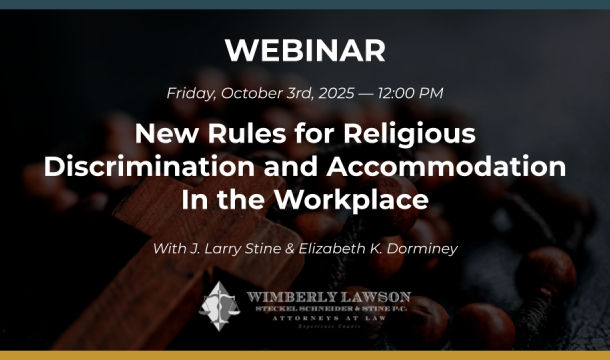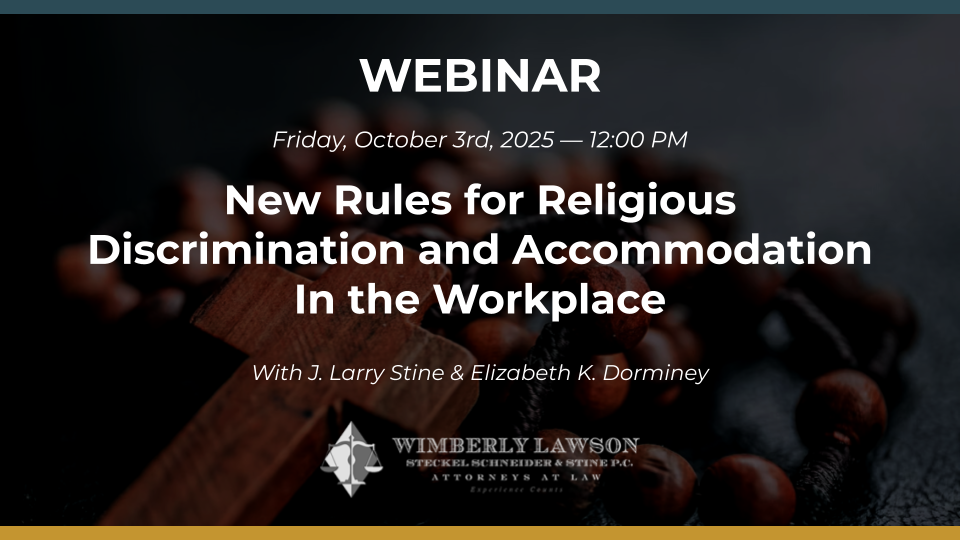Title VII Prohibits Discrimination Against Transgender Workers, Says Appeals Court
In another example of a federal appellate court using an expansive definition of the word "sex" (for another, see this blog post), the Sixth Circuit Court of Appeals ruled that Title VII's prohibition of discrimination "on the basis of sex" includes discrimination based on gender identity or because the person is transitioning between genders. (EEOC v. R.G. &. G.R. Harris Funeral Homes, Inc., 6th Cir., No. 16-2424, summary judgment reversed 3/7/18).
This case involves Aimee Stephens (formerly known as Anthony Stephens), who was born biologically male. While living and presenting as a man, she worked as a funeral director at R.G. & G.R. Harris Funeral Homes, Inc. Stephens was terminated from the Funeral Home by its owner and operator, Thomas Rost, shortly after Stephens informed Rost that she intended to transition from male to female and would represent herself and dress as a woman while at work. Stephens filed an EEOC Charge alleging sex discrimination. An interesting fact that came out of the investigation of Stephens' EEOC Charge was that the Funeral Home provided its male public-facing employees with clothing--at no cost to the male employees--that complied with the company's dress code while female public-facing employees received no such allowance. This is the kind of low-hanging fruit that will definitely get the EEOC's attention.
The court below granted summary judgment to the Funeral Home and dismissed the case. The Sixth Circuit reversed, finding that this case was controlled by the U.S. Supreme Court's decision in Price Waterhouse v. Hopkins, 490 U.S. 228 , 109 S. Ct. 1775 , 104 L. Ed. 2d 268 (1989), which held that discrimination based on a failure to conform to stereotypical gender norms is a form of sex discrimination prohibited by Title VII.
Moreover, the Sixth Circuit expressly held that that discrimination on the basis of transgender and transitioning status violates Title VII. The Court also rejected the Funeral Home's owner's argument that compliance with Title VII's prohibition of discrimination against transgender employees substantially burdened his religious practice. The owner was concerned that permitting Stephens to represent herself as a woman would cause him to "violate God's commands" because it would make him "directly involved in supporting the idea that sex is a changeable social construct rather than an immutable God-given gift. Nope, said the Court: "as a matter of law, bare compliance with Title VII—without actually assisting or facilitating Stephens's transition efforts—does not amount to an endorsement of Stephens's views."
This is a significant decision, and we will wait and see if other Circuits will embrace this interpretation of Title VII. Employers should be watching these developments closely.

Kathleen J. Jennings is a former principal in the Atlanta office of Wimberly, Lawson, Steckel, Schneider, & Stine, P.C. She defends employers in employment matters, such as sexual harassment, discrimination, Wage and Hour, OSHA, restrictive covenants, and other employment litigation and provides training and counseling to employers in employment matters.
Related Content
Get Email Updates
Recent Content

Trump Nominates Appointments to NLRB and EEOC but Policy Changes Likely to Be Delayed

DOL Launches Self-Audit Programs Designed to Help Employers Improve Compliance

DOL Must Release EEO-1 Reports to the Public under Open Records Laws

Current Advice on Active-Shooter Situations

New Policy for Federal Workers and Religious Expressions

